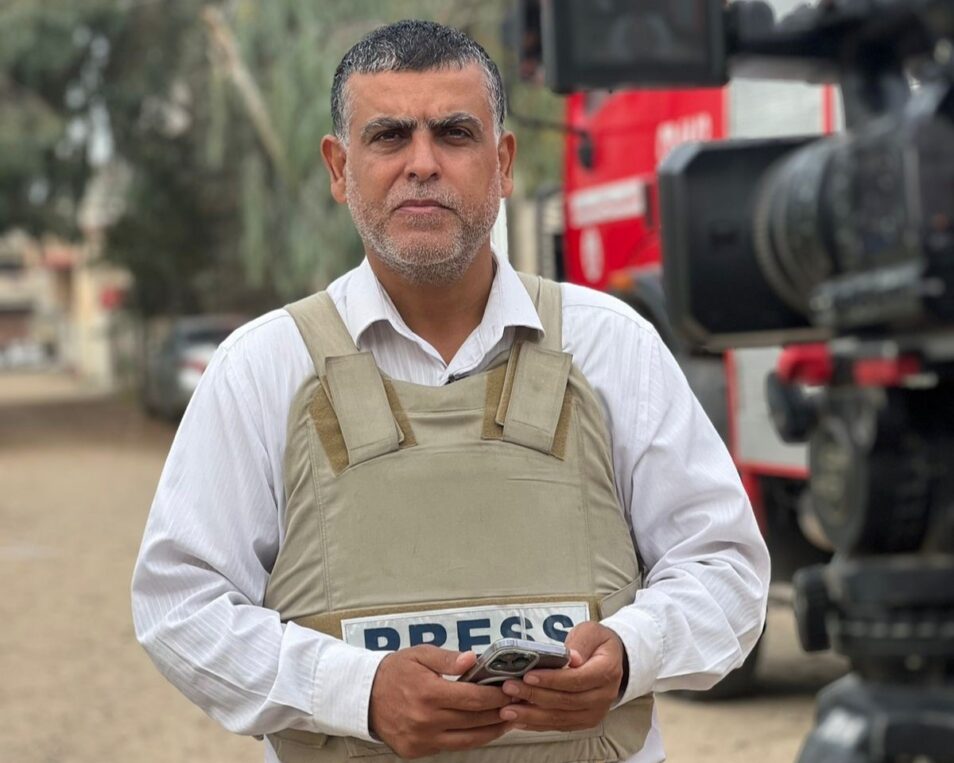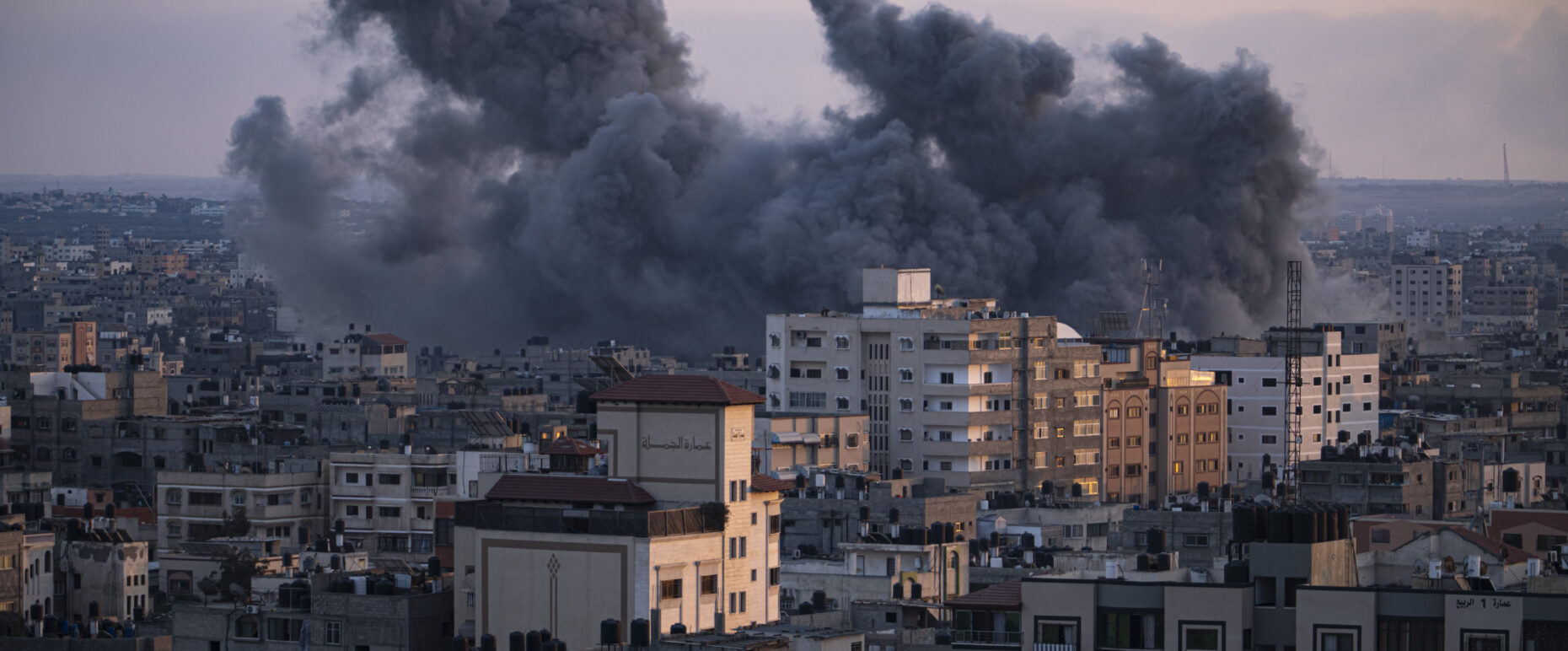AP 360 has been arranging live broadcasts from Gaza since the beginning of the Israel-Hamas war and relies on a functioning telecommunications network to coordinate with technical and reporting teams on the ground.
“Ease and clarity of communication are extremely important in conflict situations. Communications have been the main stumbling block for us in Gaza, with phone coverage going from being efficient to extremely patchy, or often non-existent.”
Samia Zuberi,
Resource and Production Desk Supervisor.
Israel declared war after several thousand Hamas militants burst across the border from the Gaza Strip into southern Israel on Oct. 7, killing 1,200 people and taking 250 others hostage. A subsequent Israeli air and ground offensive has killed tens of thousands of Palestinians, most of them women and minors, according to local health officials.
Overcoming communication hurdles in live war zone reporting
Communication services across Gaza have periodically dropped since the start of fighting, cutting the territory off from the outside world. The blackouts have prompted Palestinians in the enclave to hunt for telecoms signals to send messages to friends and loved ones. The communication challenges have also impacted live news reporting.
Before Zuberi’s London-based Bookings Desk can process any request by an international broadcaster for a live report from a correspondent in Gaza, it’s essential for them to liaise extensively with the operational team. There is a lot of back and forth coordination involved.
“Circumstances on the ground are our first consideration before we can confirm availability for any live request. We must ensure the reporter is comfortable attending a live reporting position given the volatility of the situation.”
Samia Zuberi,
Resource and Production Desk Supervisor.
The location of stand-up positions has changed several times since the conflict began to ensure safety during bombardments. The availability of cell coverage and data signals is imperative for communication, but that is complicated by relocations.

“Each broadcast transmission, received via satellite, needs to be closely monitored. This means liaising with the uplink in Gaza, our own Master Control Room in London, and with the broadcaster who is receiving the signal. We just can’t afford to lose contact with colleagues on the ground.”
Samia Zuberi,
Resource and Production Desk Supervisor.
As circumstances have changed, AP 360 has had to adapt to work safely and effectively with the Gaza team.
“In addition to emails, we have set up extensive text messaging groups to ensure information about upcoming broadcast reach the right people. Each booking needs to be dealt with at the same level of care and attention in conflict scenarios as we would dedicate to the service in less dangerous settings. We put the safety of those on the ground above all else, while simultaneously working to fulfil the broadcaster’s request. It’s been a huge challenge at times, but we’ve found our affiliates to be very understanding of this.”
Samia Zuberi,
Resource and Production Desk Supervisor.
Ensuring reporter safety and news delivery in Gaza
At the opposite end of the communication chain is Akram Al-Satarri, a freelance on-air correspondent who has been reporting from Gaza for 15 years.
The personal risk when working in a war zone is high. Al-Satarri must regularly seek shelter between live reports and location changes have proved essential – and frequent.
“Reporting has recently become extremely challenging due to the heavy bombardment, disruption to basic and essential services and scarcity of fuel supplies. Communication is a major issue. At times, it’s disrupted. But it was shut down completely for the 11th time just days ago.
“As a journalist, I’ve had to move from my home six different times. One of those moves took me away from the location where I was supposed to be conducting live reports. Travelling from my home to the live location was extremely dangerous.”
Akram Al-Satarri,
Freelance correspondent, Gaza.
Live from Gaza: delivering fact-based reporting amidst chaos
Moving around inside the Gaza Strip is not only essential for the successful delivery of live reports. As a journalist, Al-Satarri also needs to travel to gather accurate information, whether that be collecting first-hand accounts from people affected by ongoing developments or seeking out officials.
“To report on behalf of international broadcasters, I have to verify that the information we are receiving from official sources is factually correct. That includes Palestinian citizens, the Ministry of Health, the Civil Defense force and a number of other parties in the Gaza Strip.”
Akram Al-Satarri,
Freelance correspondent, Gaza.
Back in AP 360’s London hub, Zuberi praises her team members, many of whom speak Arabic fluently, for the dedicated way in which they strive to ensure Al-Satarri can contribute to international news bulletins.
“The Bookings Desk has decades of experience between them. They’ve dealt with transmissions from many conflict or disaster zones over the years and are sensitive to the dangers that on-site teams face every day. Even when telephone connections are unstable, my colleagues are efficient and remain calm. And they troubleshoot any issues quickly and with understanding.”
Samia Zuberi,
Resource and Production Desk Supervisor.

Multilingual and multifaceted: AP 360’s approach to global reporting and broadcasting
The AP’s commitment to providing fast, accurate and unbiased news reporting means covering events from all angles. In addition to offering live reporting services in Gaza, AP 360 has on-air correspondents available across the wider Middle East region. This includes Jerusalem, where we have rotated AP reporters and AP 360 staff without interruption since the Oct. 7 attack.
One of the several AP journalists that travelled to Jerusalem to report on developments in the Israel-Hamas war on behalf of AP 360 affiliates is West Africa reporter Sam Mednick. From crises in Africa and the Middle East to Russia’s War on Ukraine, Mednick’s conflict reporting experience is extensive.
As a reliable source for her broadcast content, Mednick relies heavily on published AP wire content and the ongoing reporting work conducted by her colleagues. By drawing on her personal network and journalistic skills, she is able to accurately report the war situation on behalf of international affiliates.
“I rely on AP wires, which are regularly updated with breaking news, and am in constant contact with AP colleagues on the ground. In addition to reading reports about the war and combing trusted news outlets multiple times a day, I have my own network of sources – including locals, aid groups, conflict experts, diplomats and military officials – with whom I speak regularly. I also go to as many events, talks, rallies and gatherings as possible to meet people so I can include first-hand accounts in the dispatches.”
Sam Mednick,
West Africa Reporter.
Before going on air, Mednick discusses topics with programme producers, sometimes suggesting angles for her live report depending on the news that day. They collaborate on talking points and the order of what will be said so that the images they select to accompany her delivery can align with the on-air reporting as coherently as possible.
There is constant communication ahead of and during the broadcast – especially if there are multiple live hits with the same broadcaster – where tweaks to what’s planned to be said in the report are often made, or known facts about news that is breaking may be added.
This provides value and a personalized approach if needed for each broadcaster, which is an added benefit for our live on-air reporting service.
In providing much needed perspective and diversity, AP journalists are committed to providing depth and distinction in their reporting.
“I’m usually in the field covering conflicts and crises in places that are underreported. I can spend hours interviewing people and days gathering information for longer-form, multi-media stories. In those contexts, there is more space for nuance, to dig deeper and to bring in more perspectives. Doing daily live hits requires quick thinking and the ability to boil things down succinctly and articulately while trying to get the audience to connect with you and the subject matter within a few minutes.”
Sam Mednick,
West Africa Reporter.
Find out more about our on-air reporting service and let us help you bring live news to the forefront of your media reporting, transforming the way your stories are told.



